Bible Stories for Young Adults



Marriage - Isaac’s Bride and Christ’s Bride

Memorize: "I am jealous for you with a godly jealousy. I promised you to
one husband, to Christ, that I may present you as a pure virgin to him."
2 Corinthians 11:2
Abraham's promised son, Isaac, had reached the age of forty and still was
not married. Abraham did not want his son to marry one of the Canaanite
women that lived nearby, for they were a corrupt, idol-worshipping people.
Abraham had heard that during the sixty-five years since he had left his
brother Nahor and his father Terah that Nahor had eight sons by his wife,
who also happened to be his niece, and another four sons by his concubine.
These sons also had families by now.
So Abraham called his eldest and most trusted servant to him and ordered him
on oath to leave Canaan and go back to Abraham's own kindred to seek a wife
for Isaac. Abraham's first priority for his covenantally promised son was
that his wife be a woman of godly character who knew the true God.
The servant was concerned about making the promise to fetch for Isaac a wife
and asked, "What if I go and the woman will not come back to this land with
me? Should I take Isaac to that land?"
"No! Never take Isaac back there! The Lord has given us this land here and
His angel will go before you so that you will successfully find the wife for
my son. However, if the woman does not want to return with you, then you
will be released from this oath."
The servant did not go alone nor empty-handed when he made the journey. He
had ten camels, several other servants, and many goods which were just a
sample of the wealth that Isaac owned. Upon arriving in Mesopotamia, at the
city of Nahor, Abraham's brother, the servant had his camels kneel down by
the well outside the city. It was early evening, the time at which women
come to draw water.
The servant, on such an important mission, prayed to the Lord God. "O Lord
God of my master Abraham, please make this day a success. Please show favor
to my master. As the daughters of the city come to draw water, let it so
happen that a young woman will come. When I ask her for a drink of water,
let her say, "Yes, I will give you a drink, and I will water your camels
also."
This was not the usual kind of prayer that Christians are to pray, but the
servant was looking for a kind woman who would take notice of an unexpressed
need (water for the camels), and even offer to do the hard labor to water
them. Keep in mind one camel can drink a bathtub full of water at one time,
but Abraham's servant had ten camels. Water is heavy and drawing water from
a well is not an easy task. It would take a very physically fit young woman
to do all that work, but of course, women were used to more hard labor in
that day than they are in our culture.
Even before the servant finished praying to God, a woman named Rebekah
appeared with a single pitcher on her shoulder. The Bible then states that
Rebekah was the granddaughter of Milcah and Nahor, and not only that, she
was beautiful and a virgin. A beautiful virgin is a coveted prize, for they
are so rare in our society today. The wisest of men seek this kind of woman
for a wife, for they have no emotional and sexual attachment, or "one flesh"
experience, with previous lovers and are more apt to remain faithful and
devoted in marriage. However, even those who have "messed up" can be
forgiven, cleansed, and made purer than many who never lost their virginity.
Remember that Lot's daughters were virgins when they left Sodom, according
to what Lot said, but they were not pure.
The servant ran to meet Rebekah and asked for water. She cheerfully and
respectfully fulfilled his wish and as soon as he finished drinking, she
voluntarily said, "I will draw water for your camels also." She diligently
proceeded to perform this task and the servant sat in wonder as the girl
worked. He was amazed that the Lord had apparently answered his request
just as he had prayed it.
When the camels finished drinking, Abraham's servant rewarded the woman with
some golden jewelry. He asked who she was and if there was room for him to
lodge with her family, as extending hospitality to traveling strangers was
a common practice in those days.
After Rebekah revealed that she was a relative of Abraham (she would have
been second cousin to Isaac), and they had enough straw and feed for the
camels and room enough to put the travelers up for the night, Abraham's
servant worshipped the Lord. He praised and thanked the Lord for His
providence.
As soon as Rebekah ran home to tell her mother what had come to pass, her
brother Laban went to the servant and invited him to the house. Laban
provided feed for the camels and water for the servant and the men with him
to wash their feet.
Rebekah's family set a meal before the servant, but before he allowed
himself to eat he told the whole story as to why he was there. He also told
of his prayer at the well to God and how God had answered that prayer
exactly when Rebekah appeared.
He then asked if Rebekah could go and be the wife of Isaac, who had
inherited all of Abraham's massive wealth. Both Laban and Rebekah's father
said they could hardly go against the Lord and they were willing to allow
Rebekah to go back with the servant to become Isaac's wife. With this
consent, the servant again worshipped the Lord. The servant then gave
Rebekah gifts of silver and gold, and he also gave gifts to Laban and
Rebekah's mother.
The servant and his companions then ate and drank and stayed overnight then
arose wanting to leave the next morning with Rebekah, but Laban and her
mother wanted Rebekah to stay at least another ten days before leaving.
However, Abraham's servant insisted that he must leave immediately, so they
summoned Rebekah and asked her if she were willing to leave at once.
Rebekah agreed to go. Rebekah did not just go off alone with the strangers,
but her nurse and her maids went with her. The family blessed Rebekah,
saying, "May you become the mother of thousands of ten thousands."
As the journey was ending, Isaac happened to be out in the field in the
evening meditating. He looked up and he saw the caravan of camels coming.
When Rebekah saw Isaac, she asked the servant who the man was, and he told
her that it was her husband-to-be, so she veiled herself.
After the servant told Isaac the whole story of how the Lord had answered
prayers and provided Rebekah as his wife, he took her as his wife, and he
loved her.
What the story teaches us
Though modern Americans cannot fathom marrying someone who they have never even seen, this story is much like a picture of how God seeks a people for
his Son Jesus Christ. God the Father, like Abraham, seeks a bride for his
Son Jesus Christ. The bride of Jesus Christ is the Church, the true
believers in Christ. But this bride is sought by God the Father's servant
which we know as the Holy Spirit. The Holy Spirit draws individuals to
Jesus Christ. These individuals then consent to follow the Holy Spirit's
leading to become the bride of Christ, "whom having not seen you love." (I
Peter 1:8) They know that one day they will leave their earthly home, just
as Rebekah had to leave her home, to be united with Jesus Christ, just as
Rebekah was united with Isaac.
While still in this earthly home, the members of Christ's Church are being
prepared for the great wedding. The apostle Paul said he wanted to present
the members of the Church to Christ "as a pure virgin." He wanted the
church to be "unspotted, without blemish." (Ephesians 5:27) That is, he
wanted Christians to become spiritually beautiful, pure, and chaste in
conduct, for "without holiness no one will see the Lord." (Hebrews 12:14)
Just as Abraham's servant gave gifts to Rebekah to give her assurance that
her husband would be able to provide for her, so the Holy Spirit gives us
many gifts to prove that Christ's power and love are real. Perhaps as
Abraham's servant dined with Rebekah's family, and even when he and Rebekah
were enroute to the promised destination, he told Rebekah many good things
about Isaac. Surely she anticipated a blessed life with him, just as the
Holy Spirit instructs us in the ways of the Lord.
But one other parallel appears in this story. Rebekah, who represents the
Church, both individuals and the Church collectively, was blessed and told
to become the mother of many millions. In the same way our spiritual union
with Christ right now should result in spiritual offspring as long as we are
on the earth, and perhaps even after we leave this earth.
How to find a mate
Isaac's father's responsibility was to find him a suitable bride. Arranged,
or semi-arranged marriages, occur in some parts of the world today. Often
the families agree before puberty that their son and daughter should one day
marry. This system in the Bible involved a betrothal which was a legal
agreement. In Muslim countries, the higher echelons of society take care
that their children are suitably mated. The prospective bride and groom
meet each other in a family where both families are involved. There is no
dating. If after some exposure to one another in their family settings, the
couple decide that they do indeed wish to marry, they do so. However,
marriage is not forced upon them. In this manner of mating, there is no
sexual experience before marriage.
In America's nineteenth century, the method of finding a mate was called
courtship. A young man may notice at church or in other community functions
that a certain young woman has the qualities that would make for a good
wife. He approached the father, not the girl, to ask his permission to
begin a courtship. Some Christians today are now practicing this method.
The young man may even write a letter telling the father what he believes
and thus he seeks to convince the girl's father that he is a suitable
prospect for marriage. If the father agrees that the young man would make a
good mate for his daughter, then he may see the young woman in a family
setting. There are no private outings where temptation to sexual activity
may creep up. I personally know five couples who never dated, but found
happy marriages through the courtship process. This is a growing method in
certain Christian circles.
"Dating," as it was known in the 1950's, has nearly disappeared in America.
It would be better called "whoredom," as sexual involvement to some degree
or another is expected if a couple are "going together." Contrary to what
the Kinsey report said, which we now know to be a fraudulent report because
it based its report on the activities of prostitutes, couples who are
sexually involved before marriage do not have better marriages than those
who saved themselves for the one and only.
Many good Christian books on courtship are now on the market. Visit
www.christianbook.com or amazon.com to find books on this subject. However,
the idea probably will not work unless a father is actively involved in a
spiritual way with his children. The children have to want to please their
father, and their father has to want to please the Lord. (Malachi 4:6)
This kind of trust and love has to be built from the time of the child's
earliest recollections. Only then will a father's protection and guidance
be appreciated.
Discussion
1. What kind of wife did Abraham want for his son Isaac?
2. What evidence is given that Abraham's servant had a relationship with
God?
3. What characteristics did Rebekah have?
4. Why do you think Rebekah chose to go with Abraham's servant to become
Isaac's bride even though she had never had the opportunity to be
"physically attracted" to him?
5. Describe the parallels between Abraham, his servant, Rebekah and Isaac
with God the Father, God the Son, the Holy Spirit, and the Church.
6. What attracts us to Christ though we have never seen Him?
7. Explain the difference between arranged marriages, dating, courtship,
and whoredom.
8. In recent years, such books as the Da Vinci Code, have stated that
Christ had a wife. In view of Christ's relationship to the Church, and in
view of scripture itself, why is this idea repugnant to Christians? If
Christ had had a wife, would their offspring have been born without a sin
nature?
Dig Deeper
1. Read Genesis 11:24-32 and Joshua 24:2 and tell all you can find about
Terah, Abraham's father, and Haran, Abraham's brother. How was Milcah a
blood relative of her husband Nahor? Thus, we see close relatives marrying
in this family. Why might we think Terah had reasons for his sons, Abraham
and Nahor, as well as his granddaughter Milcah, to marry close relatives?
2. Read Genesis, chapter 24. Based on this story, what advice could you
give to those seeking a mate today? The marriage of Isaac and Rebekah had
the support of both families. Why is this important for strong marriages?
3. What story do we read about in Genesis 22:1-19. How does this picture
God the Father and God the Son? Did Abraham believe Isaac would be
resurrected? (Hebrews 11:17-19)
(This is the Easter Story in Genesis.) Notice the news that Abraham got
soon after this, in Genesis 22:20-24. How might this news have affected
the main story for today?
The picture here is God the Father offered up His Son who was resurrected,
then he acquired for His Son a Bride, the Church, which is US!
4. Read 2 Corinthians 11:2-4 and 12:20-21. What is godly jealousy and why
did Paul have it? What leads us to believe that Paul feared that the
Corinthians may commit spiritual adultery? What did Paul think he may have
to mourn for?
5. Read the context of Ephesians 5:32 and tell what mystery Paul is
speaking of here. Compare earthly marriage to the unity of Christ with His church. Compare adultery to idolatry.
6. The bride is spoken of in Revelation 22:17. What does the Bride say?
Who is the Bride? Who works with the bride? A bride, a married woman,
usually produces offspring after her marriage. What should the bride of
Christ reproduce?
7. The Corinthians lived in a decadent culture where fornication was
rampant. Read I Corinthians, chapter 7, to delineate the advice Paul gives
to each of the following:
1) The unmarried who are having trouble with self-control in the area of sex
2) The unmarried who have self-control.
3) The married.
4) The divorced ("loosed")
5) The widowed
What things are said in this passage that would give even more credence to
the idea that Jesus Christ did NOT have a wife?
8. What is marriage? A famous preacher who the media discovered had gotten
his wife pregnant before they married answered, "Well, we were already
married in God's eyes." Was this true? What marks the difference between
fornication, a terrible sin and under God's curse, and married sex, which is
blessed of God? Get hints from each of the following verses.
Genesis 2:18-25, Matthew 18:16 & 2 Corinthians 13:1, Isaiah 4:1 and Isaiah 62:2, John 2:2 and Matthew 24:38, Malachi 2:14, Matthew 19:6
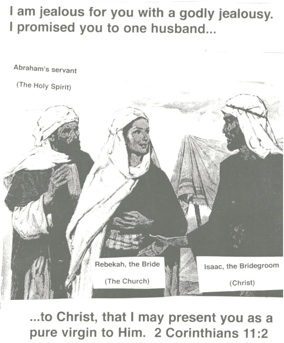
Up until this lesson, we have been studying how sins of a sexual nature can cause the destruction of a culture, a family, and of individuals. We have emphasized how serious that sexual sins are. God created sex to be only within the confines of marriage, an institution He ordained and blessed in the beginning when He created male and female. This lesson will teach what marriage is to be like and how it represents the relationship between Christ and His Church. It also emphasizes the proper way to find a godly mate.
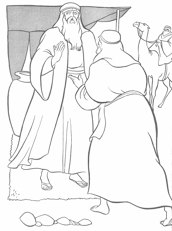
Abraham commissions his servant to seek a bride for his son Isaac, just as God the Father sends forth the Holy Spirit to draw people to Christ.
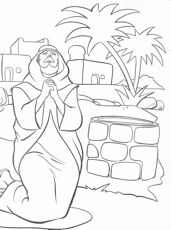
Abraham’s servant prayed for God to show him the right woman to be the bride for Isaac.
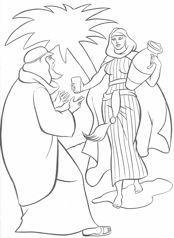
A beautiful virgin named Rebekah appeared and came to be the answer to the servant’s prayer.
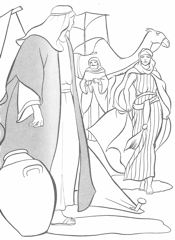
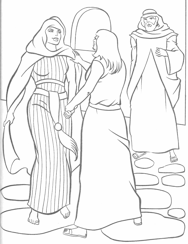
After hearing about Isaac, Rebekah agrees to go with the servant to become Isaac’s bride and she is given a blessing by her parents.
After many days of traveling with the servant, Rebekah finally sees Isaac. This reminds Christians that after traveling with the Holy Spirit “many days” in this life, we will finally see Jesus, our bridegroom.
Genesis, chapter 24, is where this story is in the Bible.

How does the early American practice of “courtship” differ from modern dating?
“You love Him, though you have not seen Him. And though not seeing Him now, you believe in Him and rejoice with inexpressible and glorious joy, because you are receiving the goal of your faith, the salvation of your souls.”



You may click on any of the highlighted Bible verses as a quick link to the passage at biblegateway.com
